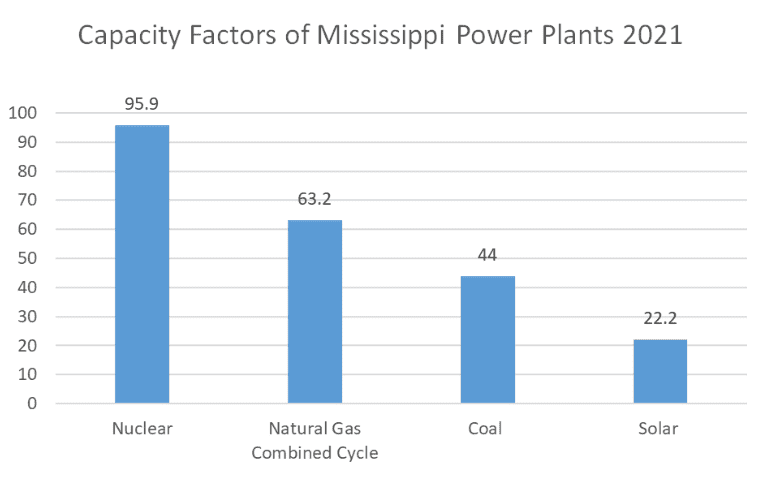In August 2022, President Biden signed the so-called “Inflation Reduction Act,” a $370 billion spending package that will do little to reduce inflation, but it will do a lot to subsidize solar power production. Unfortunately, these subsidies will lead to market distortions that will increase the cost of electricity for Mississippi families and businesses.
The biggest problem with subsidies is that they incentivize rational actors to do irrational things.
In this case, the Inflation Reduction Act provides a 30 percent Investment Tax Credit (ITC) for solar that will incentivize Magnolia-state electric companies to build facilities that otherwise would not make sense from a business standpoint.
To understand why it is irrational to subsidize solar, it helps to understand some basic facts about how this technology works.
A solar power facility, often referred to as a solar “farm” because of the large amount of land required for utility-scale electricity production, is referred to by its maximum capacity – 100 megawatts, for example. That is known as their “nameplate” capacity. But the reality is that power plants rarely operate anywhere near their capacity, and solar plants are among the worst in that regard.
Statistics from the United States Energy Information Administration (EIA) show solar farms in Mississippi only generated about 22 percent of their capacity in 2021. That means a 100 megawatt plant is operating, on average, like a 22 megawatt plant, although customers are paying for a 100 megawatt plant.
This productivity percentage is commonly referred to as a “capacity factor.” The capacity factor of solar facilities in Mississippi compares poorly to other energy sources like nuclear, which produced 96 percent of its potential output in 2021 (though it averaged only 62 percent over the previous five years), natural gas combined cycle plants, which are the most efficient natural gas plants, which produced 63 percent, and coal plants at 44 percent, as shown in the graph below.

Even these data points may overstate the usefulness of solar power because the panels can only produce electricity if the sun is shining, which is obviously beyond our ability as humans to control. On the other hand, the capacity factors of natural gas and coal plants could be improved by simply burning more fuel.
This point is crucial because one of the most important things to know about the electric grid is that electricity is generated to meet demand when that demand occurs .Think about what happens when you turn on a lamp or the air conditioner – you expect, or “demand” electricity to be there.
If demand rises as Mississippi households turn on their air conditioners or heaters, an electric company must increase the supply of electricity on the grid to meet it. Generating more electricity on demand is relatively easy with natural gas power plants and nearly impossible with solar power when the sun doesn’t happen to be shining. This is why natural gas or nuclear power plants must remain online regardless of how many solar panels are built, to ensure the lights stay on when the sun goes down.
Understanding these physical realities is essential for understanding why the Biden administration’s subsidies for solar will ultimately drive up the cost of electricity for Mississippi families and businesses.
Some economists have suggested that utility companies are not truly private companies in the sense that they are government-approved monopolies that have the exclusive right to sell electricity in their service territories. Customers living in those territories are legally obligated to purchase their power from the monopoly.
Because electric companies are monopolies, it would be unfair to allow them to charge whatever they wish, so the price of electricity must be approved by regulators at the state Public Service Commission (PSC) using a formula that allows an electric company to charge enough to cover the cost of providing power plus a government-approved profit, generally between 9 to 10 percent on equity, whenever they build new infrastructure that is approved by the Public Service Commission, whether it be a natural gas plant, a solar plant, or even new corporate offices. They even get reimbursed – and earn a profit from electricity customers – when they buy new furniture!
This regulatory structure means that every dollar spent on new infrastructure will increase electricity rates. This unfortunate reality is compounded by the fact that solar power, which is not available 24 hours a day, cannot replace natural gas plants, meaning that customers will pay for the natural gas plants and the solar plants, not whichever one happens to be lower cost.
The subsidies enacted by the Biden administration will make solar power appear more affordable on paper (never mind that subsidies don’t change the cost of a product or service, merely who pays for it) and this will entice electric companies to build more solar facilities to bolster their bottom lines for their shareholders, even though it would make more sense for ratepayers to utilize the natural gas facilities.
In this instance, it is the job of the Public Service Commissioners to scrutinize proposed projects and protect ratepayers from the rising prices that would accompany the construction of the new solar facilities.
Sadly, the fact that PSC commissioners have approved $1.4 billion in renewable energy projects since 2020—which will necessarily drive up prices— suggests that the PSC commissioners have not put the interests of ratepayers first.
While the subsidy package signed into law by President Biden was called the Inflation Reduction Act, it would be more aptly named the Inflation Production Act because the end result of the solar subsidies will be higher electricity prices for Mississippi families and businesses.